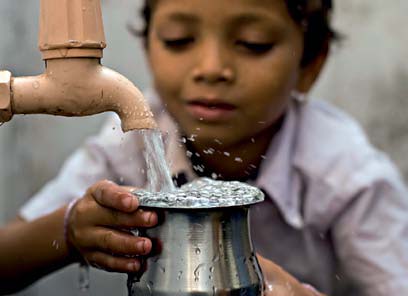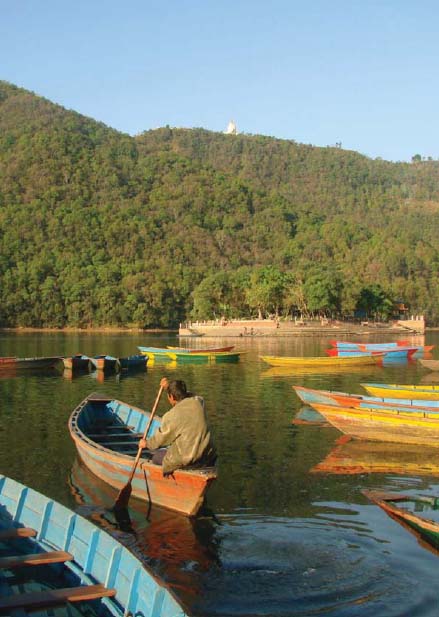/topics/water-management
Water Management
Report of the committee on slum statistics/census - Ministry of Housing and Urban Poverty Alleviation
Posted on 29 Oct, 2011 04:12 PMThis report by the Ministry of Housing and Urban Poverty Alleviation, Government of India, is the outcome of the deliberations conducted by the committee on slum statistics/census constituted by the Ministry of Housing and Urban Poverty Alleviation in the context of the realisation that there continues
New hope for Indian food security? The System of Rice Intensification – A paper by International Institute for Environment and Development
Posted on 29 Oct, 2011 11:43 AMThis paper from the gatekeeper series of the International Institute for Environment and Development (IIED) describes the potential of an innovative rice cultivation practice-the system of rice intensification (SRI)—for allowing Indian rice farmers to not only enhance rice production and their net incomes, but also to solve the water crisis.
Towards drinking water security in India: Lessons from the field – A report by Water and Sanitation Program
Posted on 29 Oct, 2011 11:33 AM This report by the Water and Sanitation Program of the World Bank provides an account of the field level initiatives on drinking water security in India. The country faces many challenges in ensuring reliable, sustainable safe drinking water supply to rural households.
This report by the Water and Sanitation Program of the World Bank provides an account of the field level initiatives on drinking water security in India. The country faces many challenges in ensuring reliable, sustainable safe drinking water supply to rural households.
Though, in terms of provision of safe drinking water, more than 90 percent of the rural households have been covered, according to the NSSO 65th round survey 2008-09, much remains to be done to improve levels of service delivery, water quality and sustainability.
An inventory of Greater Himalayan wetlands – A manual by ICIMOD
Posted on 27 Oct, 2011 03:00 PM This manual by International Centre for Integrated Mountain Development (ICIMOD) deals with an inventory of Greater Himalayan Wetlands and has been developed to assist governm
This manual by International Centre for Integrated Mountain Development (ICIMOD) deals with an inventory of Greater Himalayan Wetlands and has been developed to assist governm
Performance of sewage treatment plants - Coliform reduction - Control of urban pollution series - CPCB (2008)
Posted on 27 Oct, 2011 12:38 PMThis report presents the findings of a study conducted by CPCB with the help of Indian Institute of Technology, Roorkee and Anna University, Chennai on the performa
Decentralised treatment and recycling of domestic wastewater - An integrated approach to water management - A pilot project - CPCB (2008)
Posted on 27 Oct, 2011 10:32 AMThis report by the Central Pollution and Control Board (CPCB) describes the various intervention measures chosen to reduce the ecological footprint of the Sangamam housing project at Auroville. These measures include water harvesting, recycling and waste management.
Mapping drought patterns and impacts: A global perspective – A research report by IWMI
Posted on 26 Oct, 2011 08:11 PMThis study by the International Water Management Institute (IWMI) examines the global patterns and impacts of droughts through the mapping of several drought-related characteristics – either at a country level or at regular grid scales. Characteristics cover various aspects of droughts – from global distribution of meteorological and hydrological drought risks to social vulnerability and indices related to water infrastructure.
Climate change impact on hill agriculture and farmers adaptive strategies – A case study of Kullu valley in Himachal Pradesh
Posted on 26 Oct, 2011 06:35 PMIt takes apple as an indicator crop to investigate the positive and negative effects of climate change on farm economy. The research is a field study to determine the agricultural and socioeconomic impact of climate change on the farmers apple economy of the Kullu valley in Himachal Pradesh, India.
An overview of arsenic in groundwater in Tamil Nadu – A report by Water Resources Department
Posted on 26 Oct, 2011 06:03 PMNow-a-days heavy metal arsenic poses a health risk problem throughout the world. Arsenic may be found in water which has flowed through arsenic-rich rocks. Severe health effects have been observed in populations drinking arsenic-rich water over long periods in countries world-wide.








